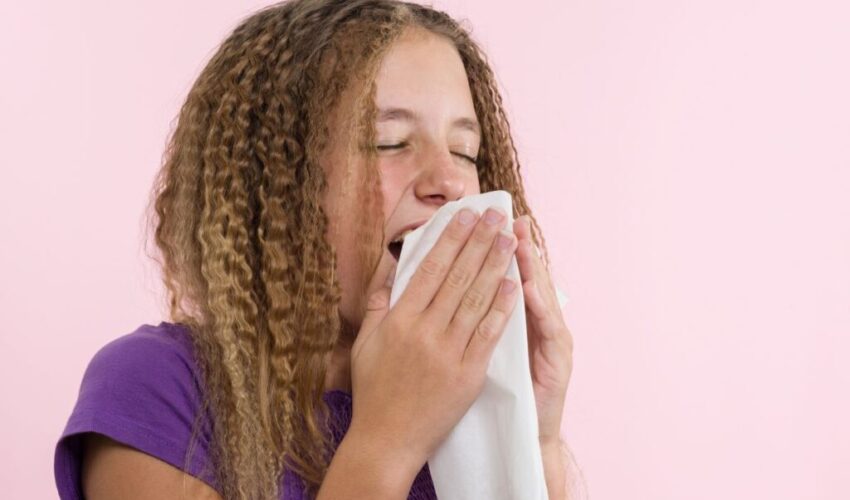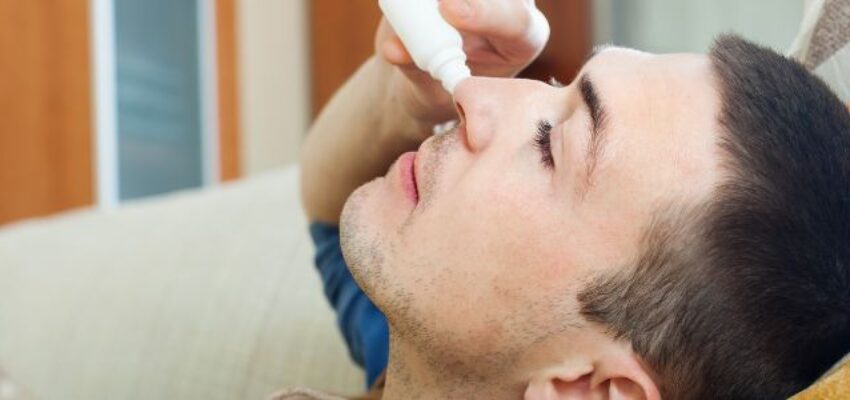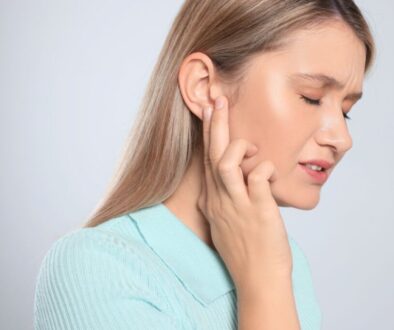How to Get Rid of Post Nasal Drip: Fast and Effective Wellness Tips

Published September 1, 2023
It’s no secret that having post-nasal drip annoys the best of us. It tickles the back of our throat and makes us cough. It makes us sore. It makes our voices hoarse and our noses runny. Although not the worst, it can affect the quality of our day-to-day lives and how we function.
Continue reading as we’ll discuss the most effective and helpful wellness tips for post-nasal drip. We’ll dive in on what it is, its causes, symptoms, and how to effectively treat them for good. Along with the best home remedies and how probiotics can aid this medical dilemma. Let’s begin.
What Is a Post-Nasal Drip?
Post-nasal drip refers to mucus from the nose or sinuses that drain into our throat. It can be related to allergies. It is also associated with an infection of the sinuses. In other cases, it can also be triggered by consuming certain foods.
If you have it, your healthcare provider may see inflammation in the nose or throat. Accumulation of mucus is also present.
What Causes Post Nasal Drip?
Post-nasal drip is a common diagnosis. It can happen for several causes. Such as:
- Allergies
- Viral infections, including common cold
- Sinus infections
- Irritants in the air, such as dust and fumes
- Something stuck inside the nose, typical for small children
- Pregnancy
- Certain medications
- Cold, dry air
- Spicy foods
What Are The Symptoms of Post-Nasal Drip?
Post-nasal drip can manifest differently from person to person. However, it has common symptoms present in those who suffer from it.
- A cough that is usually worse at night or when you are lying down
- A sore and scratchy throat
- Hoarse voice
- Nausea caused by the excess mucus moving into your stomach
- Feeling like there exists a lump in my throat
- Constantly swallowing or clearing your throat
- Halitosis or bad breath
How to Get Rid of Post Nasal Drip
A combination of preventive measures along with medication will diminish your post-nasal drip.
1. Steroid nasal sprays
Steroid nasal sprays are a practical first choice in treating post-nasal drip. They can lessen inflammation and drainage. The two are usually present in the nasal passages and sinuses.
Steroid nasal sprays start working in a few hours after taking them. Its total healing capacity should take over for a few days. It will then to completely get rid of your post-nasal drip. It would help to take them regularly for full efficacy.
2. Oral antihistamines
Antihistamines block the chemicals that trigger allergy symptoms. These drugs reduce swelling and congestion in the nasal passages. In turn, it alleviates post-nasal drip.
3. Nonsteroidal nasal sprays
Steroidal nasal sprays are another excellent option for healing post-nasal drip. Below are the common ones and how they perform:
- Azelastine. It is an antihistamine nasal spray that heals congestion and runny nose. When taken with intranasal steroids, it works wonders in healing post-nasal drip.
- Ipratropium. It works by cutting the production of mucus. It can cause headaches and nasal irritation. Ipratropium is not recommended for people who have glaucoma or an enlarged prostate.
- Oxymetazoline. It is a decongestant spray that contracts the blood vessels in the nose. In turn, relieving congestion. This medicine should only be used for a day or two
4. Saline nasal sprays and irrigations
Other safe and effective ways of healing post-nasal drip include saline nasal sprays and irrigation. A saline solution is water that has salt or sodium chloride. It keeps the nose moist and lessens the symptoms of post-nasal drip.
Nasal irrigation, on the other hand, involves rinsing your sinuses with a vast volume of saline solution. You can make your own irrigation solution. It includes sodium chloride packets combined with boiled and distilled water. If impossible, you can purchase a prepared saline wash kit at your nearest pharmacy.
Home Remedies for Post Nasal Drip
1. Propping up the head
If mucus buildup heightens at night, sleeping with the head elevated with a pillow encourages drainage. You could also prop cushions with a suitable wedge.
Propping up your head may also lessen the load of mucus a person feels in their throat.
2. Drinking fluids
The body loses water when suffering from post-nasal drip. It is why drinking plenty of liquids aids in thinning mucus. It also keeps it flowing smoothly. Further, it prevents dehydration.
Warm teas and broths may also alleviate other symptoms. They may help with a sore throat. Moreover, the steam may aid in clearing sinuses.
3. Gargle salt water
Gargling salt water helps in loosening up mucus. It also helps soothe a sore throat.
Dissolve half a teaspoon of salt into 8 ounces of warm water. Swiss for as long as it feels comfortable. You can do this once every morning and another when going to bed.
4. Inhale steam
Steam inhalation is proven to ease post-nasal drip. It works by thinning mucus. The steam will also hydrate your nose and throat. It then results in supporting mucus passing through.
5. Use a humidifier
A humidifier adds moisture to the air. In turn, it supports the reduction of mucus. It can be incredibly soothing during the winter. Winter brings dry indoor air.
6. Avoid alcohol and cigarette smoke.
Consuming alcohol only leads to dehydration. It worsens post-nasal drip. Avoiding it is especially crucial if your post-nasal drip is due to GERD. It can worsen your symptoms.
On the flip side, you should also avoid cigarette smoke. It includes secondhand smoke. Cigarette smoke boosts mucus secretion. It also irritates your nose and throat.
Quitting is challenging. Yet, your doctor can support you in building an effective smoking plan.
7. Honey and warm water
Blend a tablespoon of honey with warm water. Stir it well. Consuming it can provide relief for a sore throat that worsens post-nasal drip.
Is Post-Nasal Drip Contagious?
Post-nasal drip itself is not contagious. However, if the reason for it is an underlying upper respiratory infection, you might likely pass that to others. Your post-nasal drip may be the result of a URI if you have symptoms such as:
- Sneezing
- Sore throat
- Mild fever
- Runny nose
- Headache
- Cough
Do Essential Oils Relieve Post-Nasal Drip?
Essential oils are concentrated liquids yanked from plants. They are usually used as natural remedies for various ailments. Some oils, like eucalyptus and peppermint, can heal post-nasal drip.
According to 2020 research, eucalyptus oil contains a compound called 1,8-cineole. It lessens mucus by controlling genes responsible for mucus production. The compound also has anti-inflammatory properties. It soothes irritation.
Peppermint oil contains menthol. It improves the sensation of congestion. It aids in bettering mucus buildup. A 2013 study ruled that inhaling methods help your nasal passage feel more open.
Post Nasal Drip in Pregnancy.
There is a link between pregnancy and post-nasal drip. Doctors call this pregnancy rhinitis.
There is an elevation in blood volume and hormone fluctuations in pregnancy. The two may influence increased mucus production. The excess mucus then blocks the sinuses. It drains down the throat. It, in turn, triggers post-nasal drip and associated symptoms.
Probiotics for Post Nasal Drip
Probiotics have benefits that can manage post-nasal drip. Probiotics, such as Lactobacillus strains, have found beneficial effects on chronic rhino conjunctivitis. It also improves nasal congestion and improves symptoms associated with post-nasal drip.
Regular use of probiotics may aid in enhancing nasal and sinus disorders. It is related to allergies and immune system dysfunctions. One study also showcases that regular intake of it reduces nasal pathogenic bacteria. With less to no harmful bacteria in your body, less mucus production will arise. Thus safeguarding you from post-nasal drip.
It’s vital to look for not just any probiotic. But a probiotic supplement in the market crafted explicitly for ear, nose, throat, and mouth issues. And that includes post-nasal drip. Bionaze is a high-quality, wholesome probiotic supplement. It is formulated with two cutting-edge probiotic strains, BLIS K12 and BL-04. Many studies have proven their efficacy. These strains help treat and prevent various ear, nose, throat, and mouth issues. It’s available in lozenge form too. This form enhances its efficacy.
When to See a Doctor
You should consult your doctor if you have bloody and smelly mucus, chest pain, and trouble swallowing. These symptoms may indicate a more severe cause of post-nasal drip. Complications may arise.

Frequently Asked Questions About Post Nasal Drip
1. What foods stop post-nasal drip?
Foods rich in antioxidants can help protect the mucous membranes. They also reduce inflammation. Opt for citrus fruits, kiwi, spinach, berries, and other vegetables. It is if you suffer post-nasal drip. Incorporating foods high in omega-3 fatty acids will help, too. They have anti-inflammatory properties that aid in relieving nasal congestion. Eat pumpkin seeds, walnuts, flaxseeds, and salmon. Do so if you’re dealing with this health dilemma.
2. What makes post-nasal drip worse?
Allergens. Exposure to pollen, dust mites, pet dander, and mold can trigger an allergic reaction. It, in turn, will lead to increased mucus production. It makes post-nasal drip worse.
3. How do you sleep with post-nasal drip?
Use an extra pillow to elevate your head and upper body. Doing so will reduce the accumulation of mucus in your throat as you sleep. It would also help to use a humidifier while you sleep. Adding moisture to the air can alleviate dryness in your nasal passages and throat. It, in turn, will make breathing easier and lessen nighttime symptoms. Finally, consider taking a warm shower or inhaling steam before bed. The two can help moisturize the nasal passages. They also loosen mucus and relieve any irritation.
4. Should I ignore the post-nasal drip?
It is not recommended to ignore post-nasal drip. It can be uncomfortable and lead to sore throat, coughing, and congestion. Various treatments and home remedies, including probiotics, can treat post-nasal drip. Thus, it’s easier now than ever to take over one’s health and take action toward wellness.
Post-nasal drip is caused by excess mucus draining from the nose and sinuses to the throat. It is one of the most common causes of a nagging cough. It gives a sore and scratchy throat, hoarse voice, and bad breath, among others. As we’ve discussed above, there are a lot of treatment measures and home remedies that can treat it. Not to mention, probiotics can put an end to it, too. Take over your wellness. Treat your post-nasal drip if you’re suffering. Also, consider sharing this informational article with others. We don’t know whose lives we can help.
Benefit From The Latest Advancements In Probiotic Science With Bionaze
Bionaze is a proprietary blend of probiotics proven to promote ear, nose, and throat health, improve digestion, and support your immune system. The active ingredients BLIS K12, and BL-04 are considered among the best probiotics according to science.
Get 25% Off Your First Order when you use BIO25 at checkout!

This Content Has Been Reviewed For Factual Accuracy
This content has undergone thorough fact-checking by our team of internal experts. Learn more about the meticulous editorial standard for our website here.
ADVERTISEMENT

About The Author
I am Tracy Gorman, a seasoned writer passionate about creating helpful content. I can delve into any niche and produce valuable articles with my expertise. Beyond writing, I am an avid learner with a passion for digital marketing. During my leisure time, I enjoy immersing myself in literature, experimenting with fashion, staying active, exploring culinary delights, indulging in movies, savoring music, and socializing. And, it’s safe to say, I love cats!




